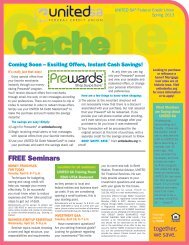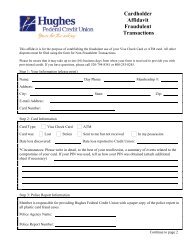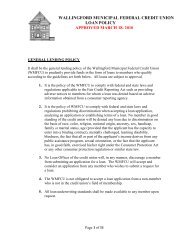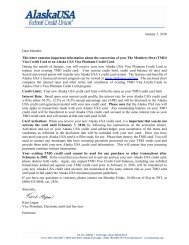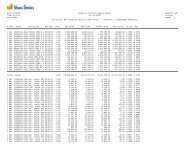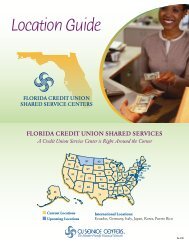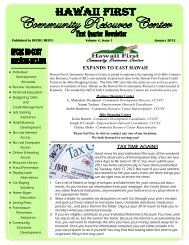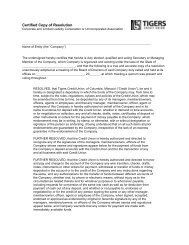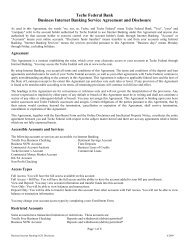Income and Expense Worksheet - Liberty Online
Income and Expense Worksheet - Liberty Online
Income and Expense Worksheet - Liberty Online
Create successful ePaper yourself
Turn your PDF publications into a flip-book with our unique Google optimized e-Paper software.
Overview<br />
A worksheet to help you<br />
track your income <strong>and</strong><br />
expenses.<br />
• Monthly income <strong>and</strong><br />
expenses<br />
• Tracking cash spending<br />
• Calculating seasonal <strong>and</strong><br />
uneven expenses<br />
• Adding it all together<br />
• <strong>Worksheet</strong><br />
<strong>Income</strong> <strong>and</strong> <strong>Expense</strong> <strong>Worksheet</strong><br />
You may be familiar enough with your income <strong>and</strong> spending patterns <strong>and</strong><br />
your levels of savings <strong>and</strong> borrowing to fill in parts of the worksheet right<br />
now, either by yourself or with the help of others in your household.<br />
Some details, however, may require some research. Keep in mind that this<br />
worksheet is to help you see where you st<strong>and</strong> with your money. It doesn’t<br />
have to be accurate to the penny. “Pretty good” information is better than<br />
no information at all if it helps you underst<strong>and</strong> your financial picture.<br />
Monthly income <strong>and</strong> expenses<br />
Start by filling in the information you know. Then look at those items you left<br />
blank or guessed at without much confidence. You can fill in some of these<br />
missing numbers by looking through bills you’ve paid, including credit card<br />
statements, or by sorting through bank statements to find canceled checks. Cash<br />
spending will take some creative effort to track. Spending on seasonal items, too,<br />
or those for which your payments vary greatly from month to month, will take<br />
some extra research <strong>and</strong> calculation to fit into a monthly format.<br />
The worksheet includes a place to record your pre-tax retirement savings<br />
contributions. (This includes contributions to a 401(k) or other pre-tax savings<br />
plan.) You may want to list any contributions your spouse or partner is making to<br />
such a plan <strong>and</strong> consider if you want to maintain that level of contribution.<br />
Following a layoff, some people temporarily reduce or eliminate such<br />
contributions to stretch their budget.<br />
Tracking cash spending<br />
One way to find out how much cash you spend is to pay careful attention to your<br />
spending for two weeks or a month. (One week may not be enough to give a full<br />
picture, <strong>and</strong> a longer sample is likely to be too much work.) Keep receipts for<br />
every cash expense during the time you choose, or note spending on a pocketsized<br />
pad of paper. At the end of the period, sort the receipts or review your<br />
notes <strong>and</strong> add up how much you spent on lunches, groceries, movies, laundry,<br />
gas, cigarettes, <strong>and</strong> the other categories on the worksheet. If you’ve tracked<br />
spending for two weeks, multiply the amounts by 2.16 to get a monthly spending<br />
estimate.<br />
Calculating seasonal <strong>and</strong> uneven expenses<br />
Some bills are due once a year, such as car registration fees <strong>and</strong> excise taxes; some<br />
are due semiannually or quarterly, such as property taxes; <strong>and</strong> some, such as<br />
57135-0207
2 <strong>Income</strong> <strong>and</strong> <strong>Expense</strong> <strong>Worksheet</strong><br />
insurance <strong>and</strong> heating bills, may be high in some months <strong>and</strong> low in others.<br />
Other spending -- on clothing, car repairs, <strong>and</strong> gifts, for example -- occurs<br />
unevenly, with big expenses in some months <strong>and</strong> small or no expenses in others.<br />
For all of these expenses, you will need to find copies of past bills or other<br />
spending records <strong>and</strong> estimate what you would pay each month if the payments<br />
were spread evenly throughout the year.<br />
• For a quarterly tax bill, this is a simple matter of dividing the last payment by<br />
three (since the bill covered a three-month period).<br />
• For bills due just once a year, divide by 12 to get a monthly average.<br />
• For seasonal <strong>and</strong> uneven expenses, find out what you paid during all of last year<br />
by looking through bills, canceled checks, <strong>and</strong> credit card statements, or simply<br />
by estimating cash payments. Then divide that annual total by 12.<br />
• For weekly expenses, multiply by 4.33 to get an estimate of monthly spending.<br />
Adding it all together<br />
Once you’ve filled out the worksheet as completely as you can, subtract monthly<br />
spending from monthly income. This gives you a snapshot of your financial<br />
picture.<br />
If your expenses are greater than your income, the worksheet can help you see<br />
what might be causing the shortfall <strong>and</strong> where you might need to cut back or<br />
reduce expenses.<br />
It can be hard to make do with less when finances are tight. By filling out the<br />
worksheet, you can figure out where to make changes in your budget <strong>and</strong> adjust<br />
your plan before you reach the crisis point.
3 <strong>Income</strong> <strong>and</strong> <strong>Expense</strong> <strong>Worksheet</strong><br />
<strong>Worksheet</strong><br />
Monthly net income<br />
Monthly net salary/wages after taxes<br />
Other household income<br />
Child support/alimony<br />
<strong>Income</strong> from other sources<br />
Payroll savings<br />
Total monthly net income<br />
Pre-tax retirement savings<br />
Monthly expenses<br />
Actual income<br />
Budget<br />
Home expenses Actual spending Budget<br />
Mortgage or rent<br />
Second mortgage or home equity loan<br />
Home insurance or renter’s insurance<br />
Property taxes<br />
Repairs <strong>and</strong> maintenance<br />
Utilities: Oil/gas<br />
Electricity<br />
Water/sewer/trash<br />
Telephone: basic service<br />
Telephone: long distance<br />
Cell phone/pager/Internet<br />
Total home expenses<br />
Transportation<br />
Vehicle #1 payment<br />
Vehicle #2 payment<br />
Vehicle maintenance/repairs<br />
Vehicle insurance<br />
Gasoline<br />
Tolls/parking<br />
License/registration/excise tax<br />
Public transportation<br />
Total transportation
4 <strong>Income</strong> <strong>and</strong> <strong>Expense</strong> <strong>Worksheet</strong><br />
Food/clothing Actual spending Budget<br />
Groceries<br />
Work/school lunches<br />
Clothing<br />
Laundry/dry cleaning<br />
Total food/clothing<br />
Health care<br />
Life/disability/long-term care insurance<br />
Medical/dental/vision premiums<br />
Medical/dental/vision out-of-pocket<br />
Total health care<br />
Family<br />
Child/older adult care<br />
Education/tuition<br />
Child support/alimony payments<br />
Lessons/camp/sitters<br />
Allowances<br />
Total family<br />
Leisure <strong>and</strong> recreation<br />
Eating out<br />
Entertainment/hobbies<br />
Cable TV<br />
Books/magazines/newspapers<br />
Fitness club<br />
Classes/lessons<br />
Vacation/travel<br />
Total leisure <strong>and</strong> recreation<br />
Saving/investing<br />
For emergencies<br />
For retirement/other<br />
For college<br />
Total savings/investing
5 <strong>Income</strong> <strong>and</strong> <strong>Expense</strong> <strong>Worksheet</strong><br />
Other expenses Actual spending Budget<br />
Health/beauty<br />
Personal gifts<br />
Contributions/donations<br />
Pet care<br />
Professional/union dues<br />
Alcohol<br />
Tobacco<br />
________________________________<br />
________________________________<br />
________________________________<br />
________________________________<br />
Total monthly expenses<br />
Net monthly cash flow<br />
(<strong>Income</strong> minus expenses)<br />
Written with the help of Jonathan Hefner, M.A., L.P. Mr. Hefner is a licensed psychologist who<br />
specializes in financial <strong>and</strong> legal counseling in Minnesota. He is a manager of financial <strong>and</strong> legal services<br />
at Ceridian.<br />
© 2001, 2007 Ceridian Corporation. All rights reserved. 021307



